34th European Men's Gymnastics Championships: Six Croatian Gymnasts to Chase Gold in Final
December 11, 2020 - As many as six Croatian gymnasts will compete for medals in Mersin, Turkey, on Sunday as part of the European Championships - juniors Liam Rebić and Mate Žugec on the pommel horse, and seniors Aurel Benović on the floor, Filip Ude and Robert Seligman on the pommel horse, and Tin Srbić on the horizontal bar.
Of the entire Croatian delegation, Jakov Vlahek did not make the finals, as he came 14th on the pommel horse. Tin Srbić, the defender of the European silver medal, received the best score of 14,333 in the qualifying round. Aurel Benović deserved his first European final by coming in sixth in the qualifications.
"I went through the qualifiers at this year’s strange European Championships. Honestly, I planned to go into the exercise with a start of 6.2; in the end, it turned out to be 5.8 because I started off poorly, pulled out the jumps, and decided to throw out the "Možnik" element in the middle of the exercise. It would be a little too much for me at that point. I felt like it was training. There are certainly no such calculations in the finals, and I am going with my best exercise, and we are going to attack the medals," said Srbić.
As expected, there were many big names in Turkish gymnastics (Ibrahim Colak, Ahmet Onder) in the finals, and it is a great pity that we cannot see top Russian and French gymnasts in Mersin who canceled their arrival.
Due to the pandemic, Mersin, Turkey replaced Baku, Azerbaijan, where the European Gymnastics Championships were to be held this spring. So far, the strangest EP in the history of gymnastics is being held with strong epidemiological measures and daily COVID-19 testing. The entire national team of Azerbaijan and the juniors from Serbia have already returned home due to infection.
Hard times, but we must wait for Sunday.
To read more about sport in Croatia, follow TCN's dedicated page.
Virtual Christmas Windows: How AR is Augmenting Advent in Zagreb Reality
December 11, 2020 - The pandemic has necessitated a fresh approach for Advent in Zagreb. Meet Virtual Christmas Windows, a new AR approach to the festive season.
The uncertainty caused by coronavirus has entered every aspect of our lives this year, nowhere more so than event planning.
Big events necessarily need to be planned in advance, and with the uncertainty of a fresh outbreak, the challenges of adapting to late changes are considerable. Nowhere has this been more true than the award-winning Advent in Zagreb, which has become one of the defining tourism spectacles of the Croatian capital in a short space of time, after Zagreb was voted Best Christmas Market in Europe three years in a row. The city in December was transformed from a relatively quiet winter metropolis to a beacon of light and festive cheers, attracting hundreds of thousands of tourists and providing a late-season boost for the Croatian tourism industry.
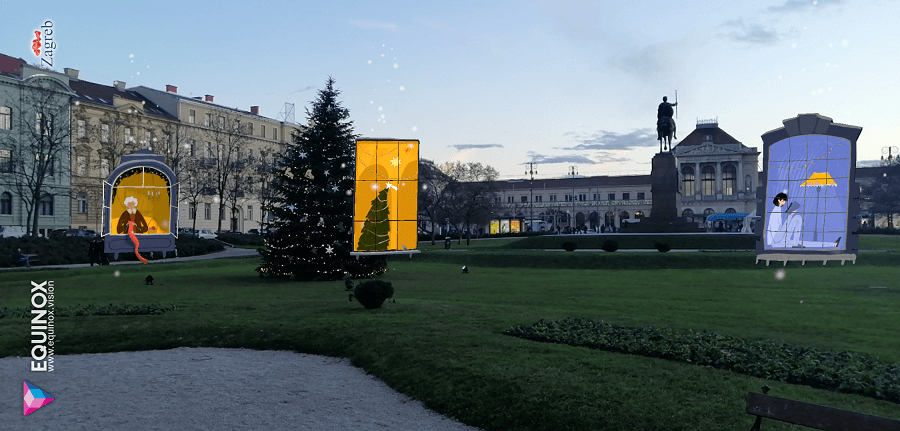
The tourism chiefs decided that Advent in Zagreb 2020 would go ahead, albeit in a very different format to previous years. With a strong emphasis on art and culture, a rich programme of concerts can be enjoyed virtually, and efforts were made to give the city its festive feel without the crowds gathering for their traditional mulled wine and sausages in the wooden stalls dotted all over the city.
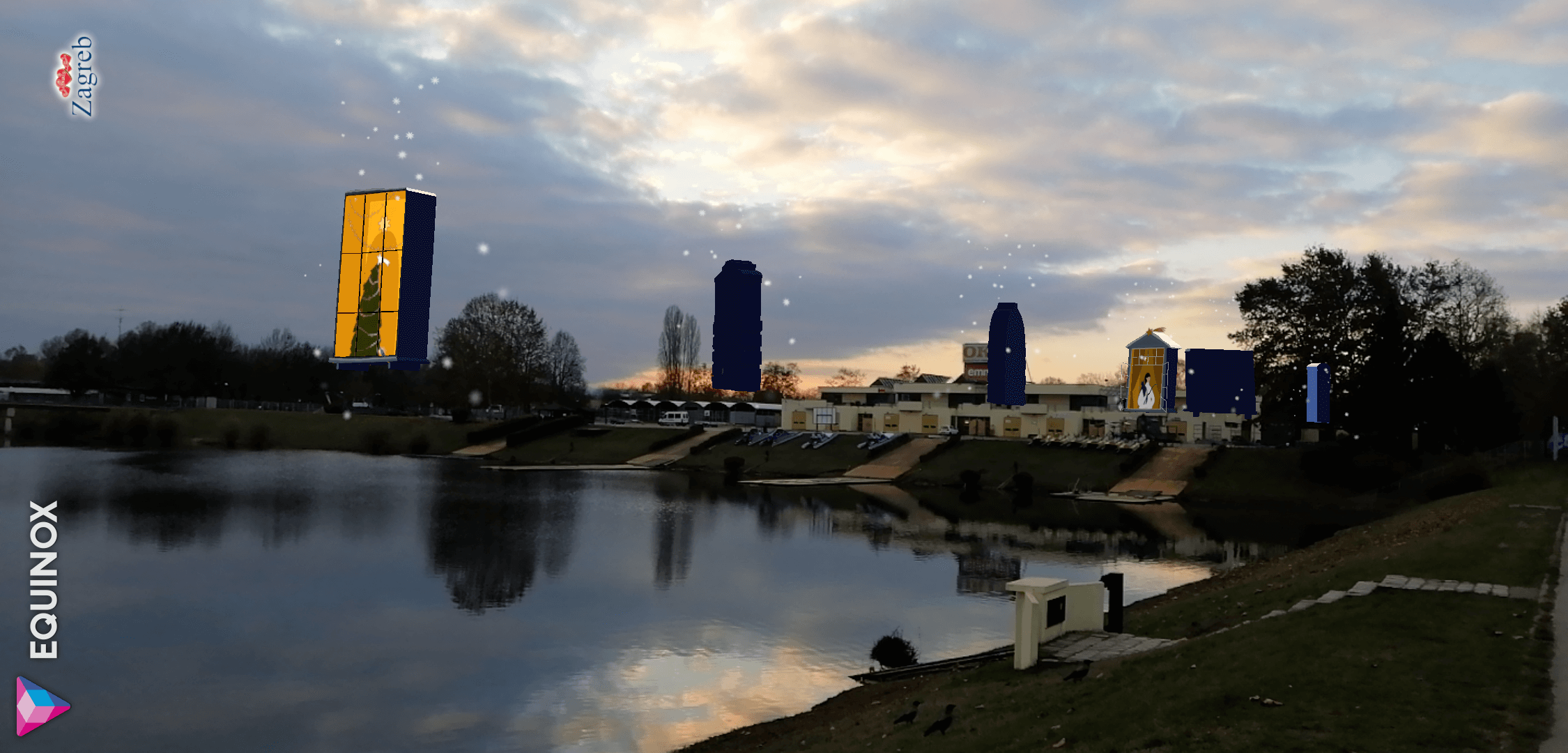
One of the most innovative ways of achieving this is the Zagreb Virtual Christmas Windows project, the first time that Augmented Reality (AR) has been used in such a way at Advent in Zagreb. For many people, this will be their first experience with Augmented Reality, allowing them to see and interact with virtual, 3D objects, inspiring and heartwarming art, all of which can be accessed with your smartphone.
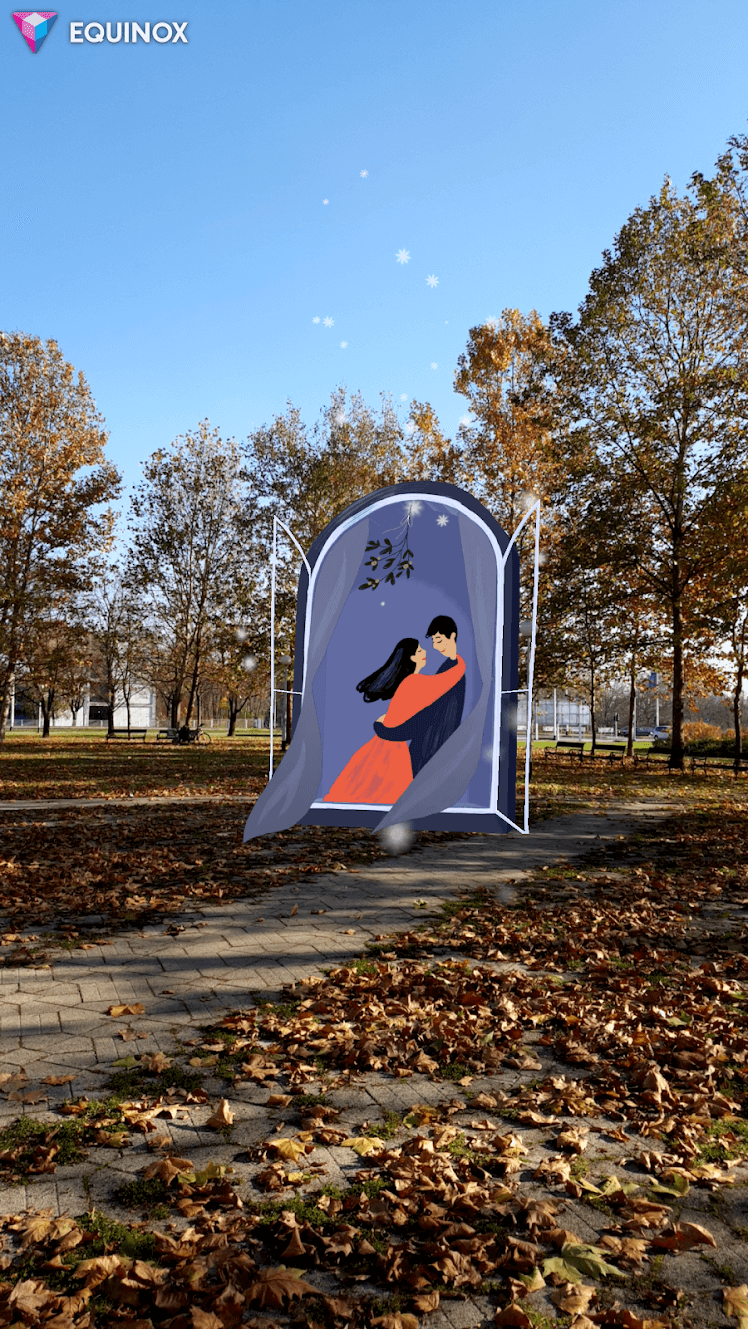
The project has been developed in partnership with AR specialists Equinox XR, which is run by Ivan Voras, co-founder of the popular Surove Strasti podcast. The artwork was inspired by the holiday season, by the need for people to stay safe indoors, and by the stylised look of some of the old town buildings. Equinox received the 2D artwork envisioned by Zoran Djukic and drawn by Mateja Kovac, which was then transformed to a 3D experience by 3D designer, Igor Puskaric. The artwork depicts windows in wintertime, with people staying safe in their homes. Viewers can peek into the windows and see a slice of life, accompanied by appropriate sounds and music specific to each window.
It is a very atmospheric and immersive experience, an art form which enriches a location with visual and auditory cues and pulls the viewer into a certain mood, while being present in familiar places.
The AR artwork can be found in 20 locations all over Zagreb, in parks and squares.
In order to access the content, simply download the Equinox XR application, which is available on Google Play here, and in the iStore here. Once you have opened the app, go to 'Advent Zagreb' and get started! The app will then display information on what is available in the immediate vicinity. Simply click on the icon which appears on your mobile phone screen, and you will be guided to the exact place where the exhibition is located. By rotating your mobile phone, as if you are to take a photo, you can go through the exhibition and interactively participate in it - take photos or share content on social media. You can get a teaser in the video below.
If you are unable to make it to Zagreb this Advent, you could still have the opportunity to experience Virtual Christmas Windows in your home town. There are plans to expand this service to locations around Zagreb, other cities in Croatia, and even internationally. More information as we get it, but as you can see from the map above, Pula, Split, Rijeka and Osijek have also been included.
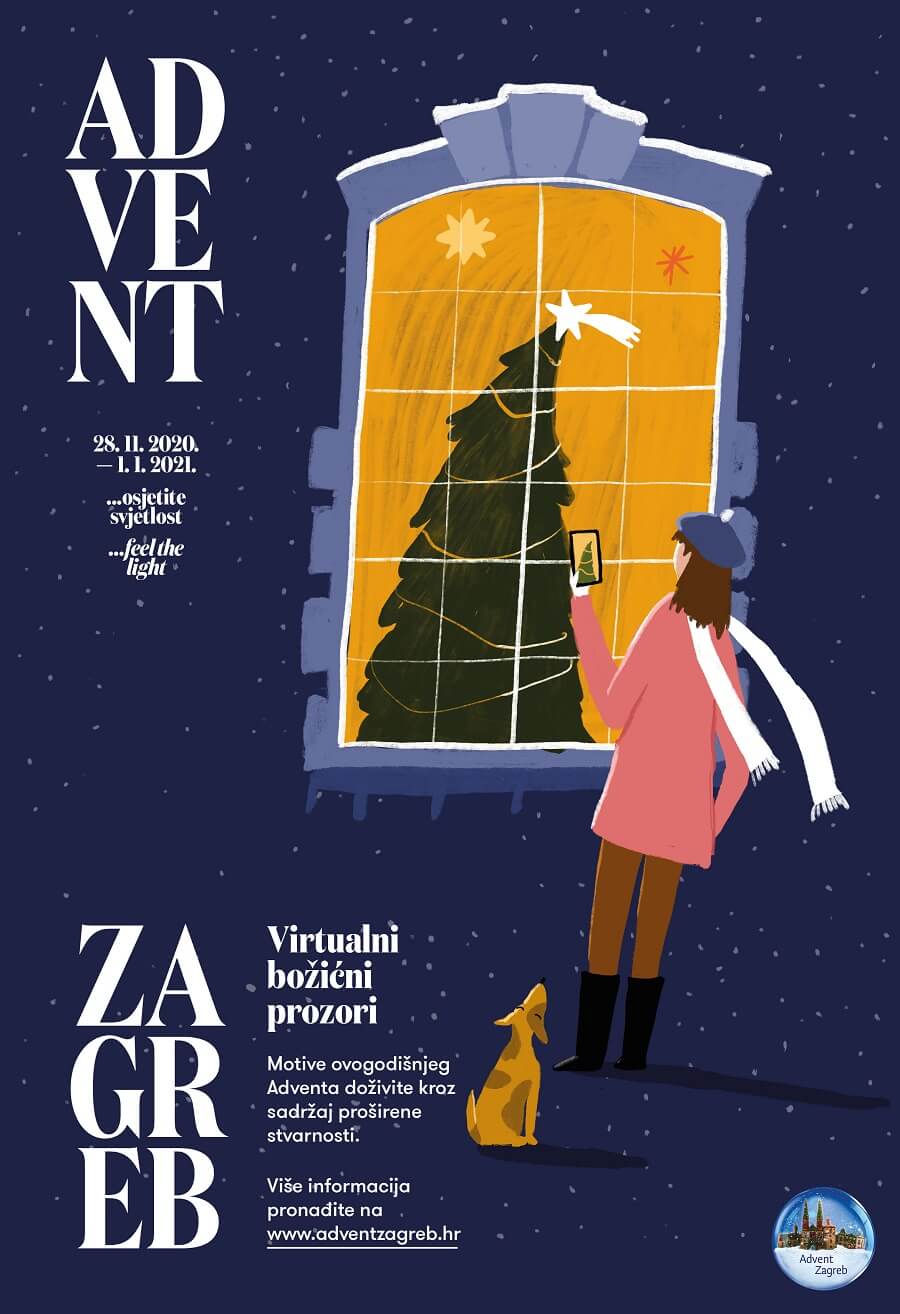
A nice festive touch in these socially distanced times, and a great example of how technology and tradition can adapt to the unique challenges of 2020.
To learn more about the Advent in Zagreb 2020 programme, visit the official website.
For the latest news from Zagreb, visit the dedicated TCN section.
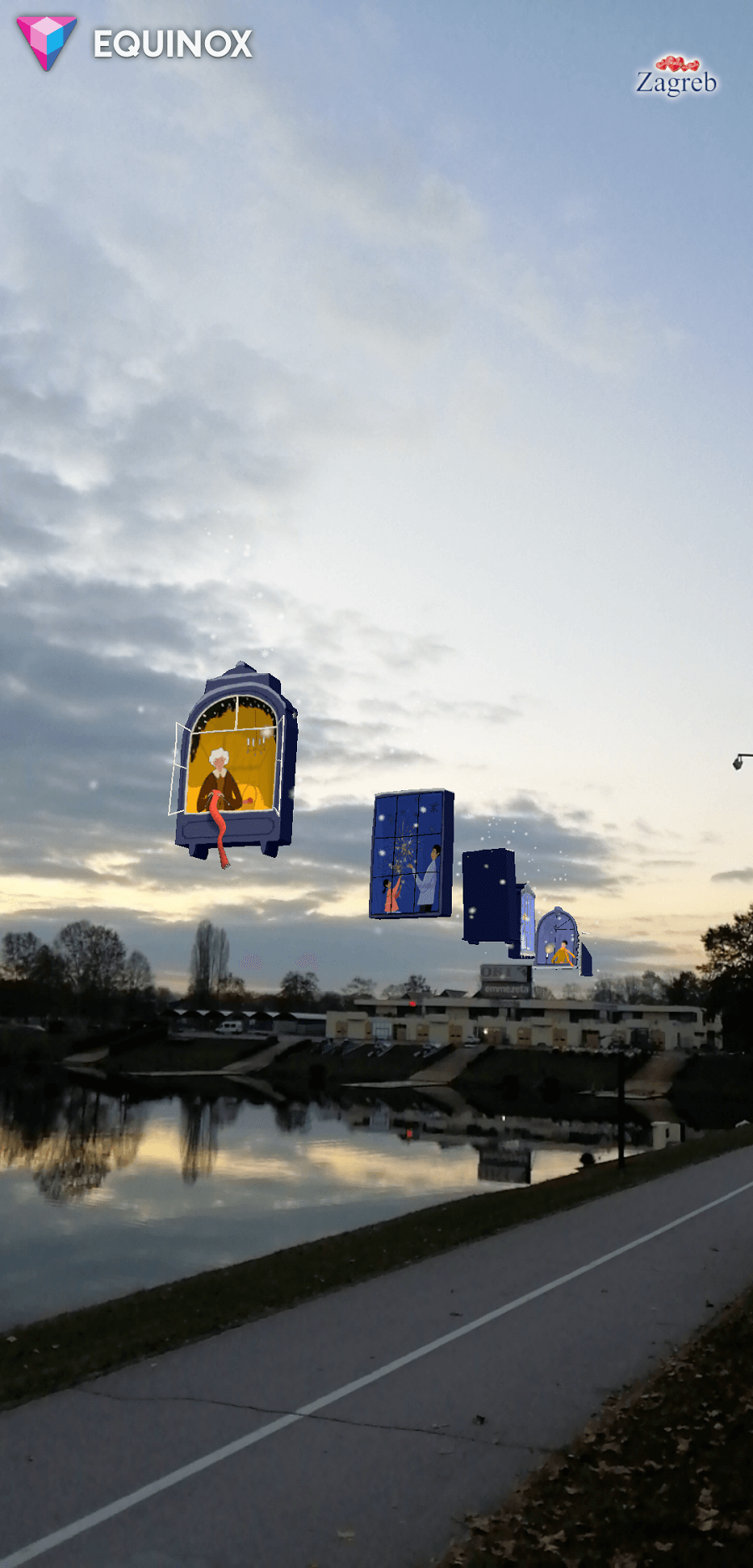
And some images from Split...
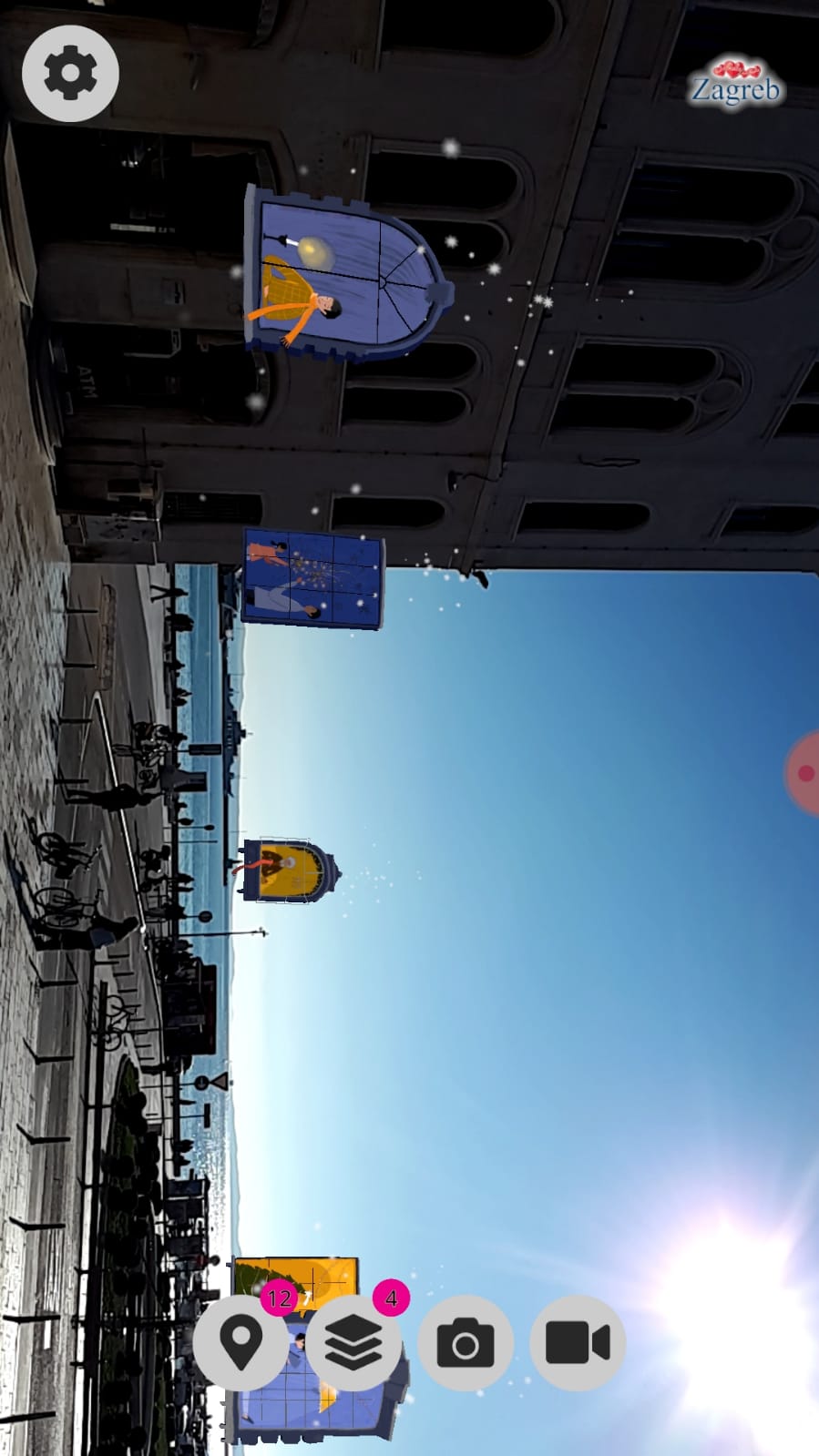
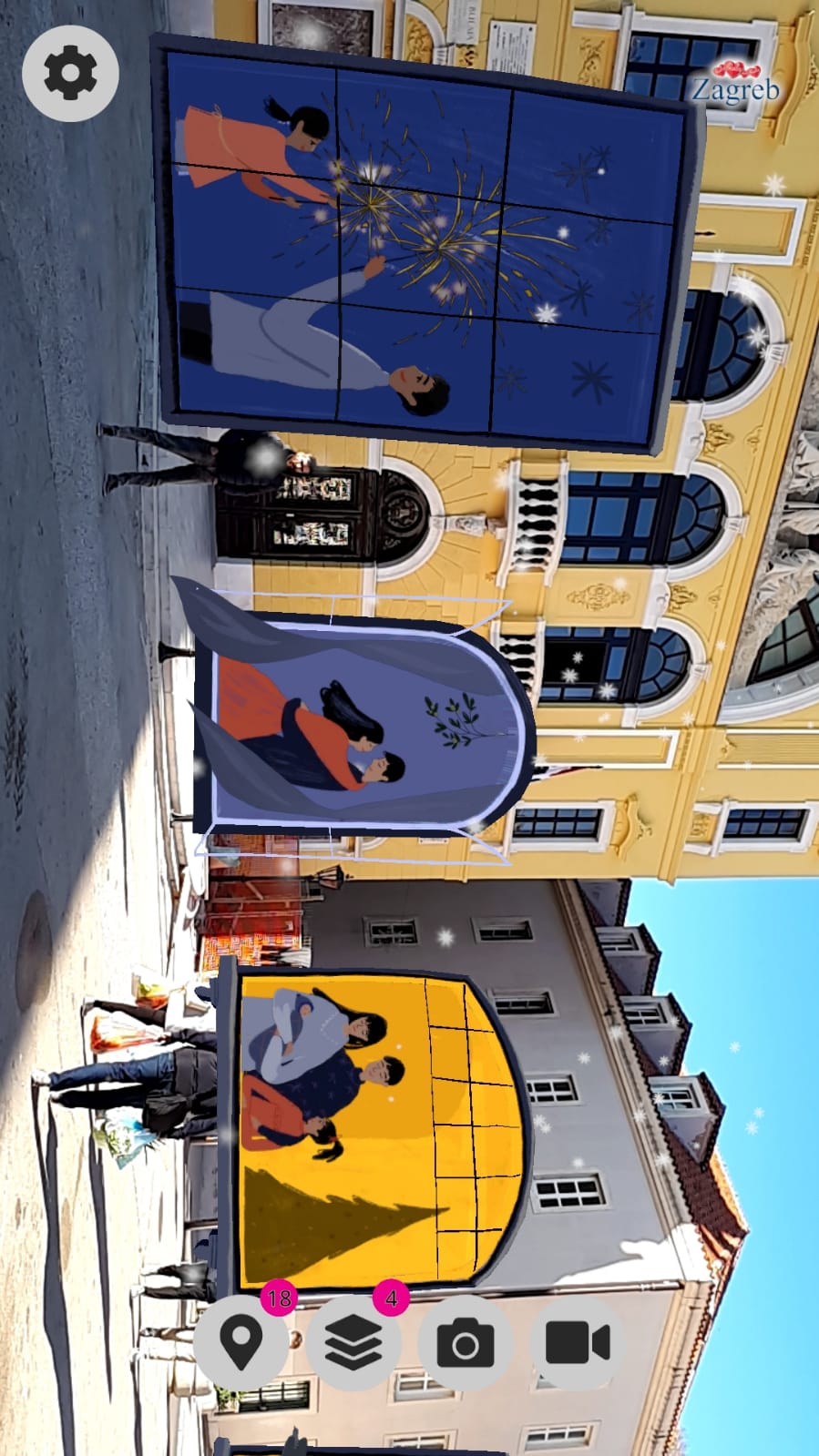
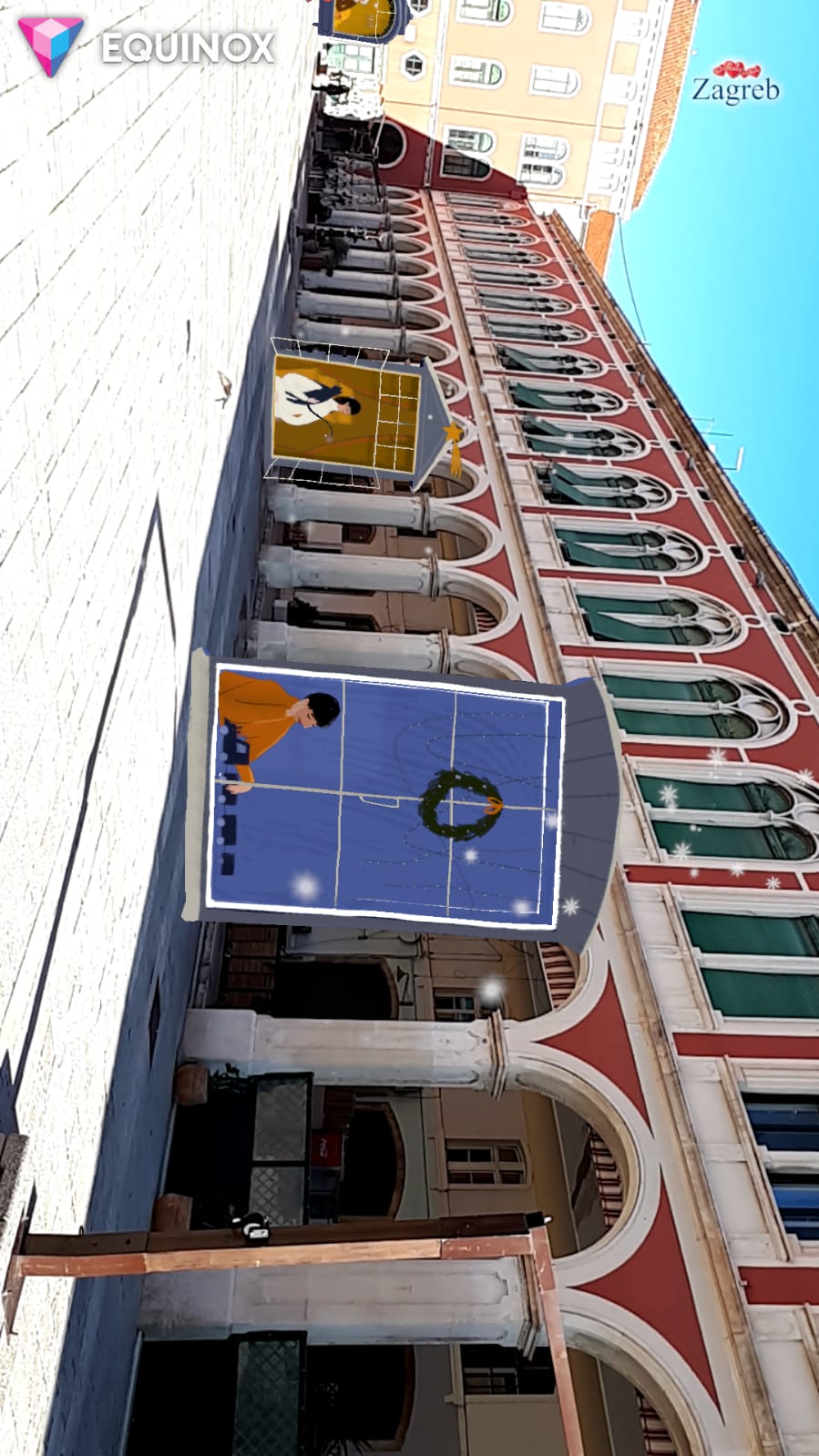
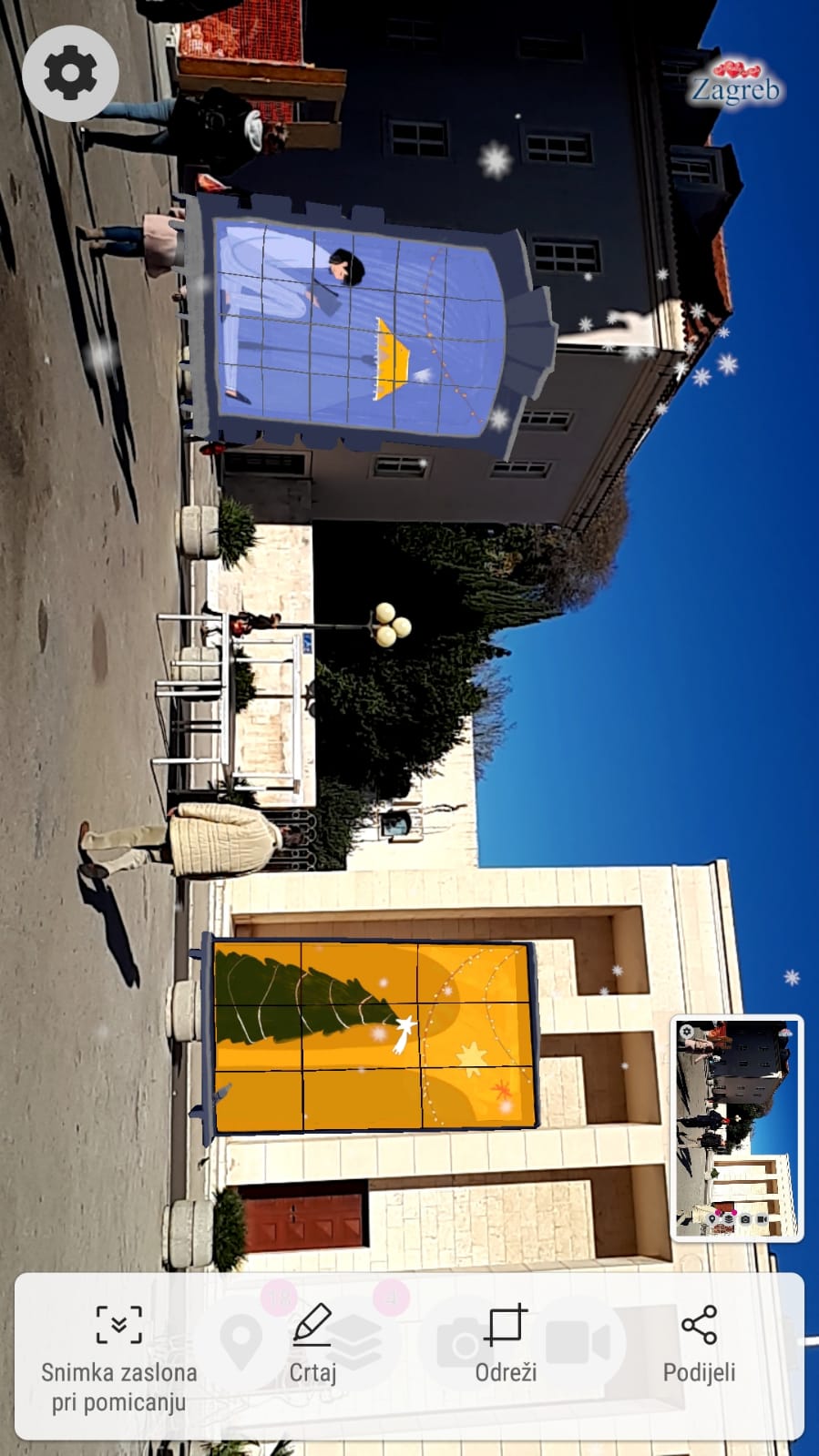
Flights to Croatia: Air France Reduces Paris-Zagreb in December
December 11, 2020 - The latest news for flights to Croatia as Air France reduces Paris-Zagreb in December.
Croatian Aviation reports that French national carrier Air France has reduced the number of weekly flights between Paris and Zagreb this month.
Although Air France originally planned to operate more frequently to Zagreb in December this year, this is not the case. The airline currently operates only two flights a week on this route, which is not surprising given that the airline from the same group, Dutch KLM, with which Air France works closely, currently operates daily to Zagreb.
By the end of December, Air France will operate only 7 return flights on the Paris - Zagreb - Paris route. The airline currently operates on this route twice a week, on Wednesdays and Saturdays, with E190 aircraft that have a capacity of 100 passengers in the fleet of this carrier.
The airline decided to add just one flight around the Christmas holidays, on Monday, December 21. Given the capacity of the aircraft used by Air France on this route, 1,400 seats between Paris and Zagreb are available until the end of December.
Direct flights are available on Wednesdays, Thursdays, Saturdays, and Sundays.
Recall that Croatia Airlines operates on the same route, on Thursdays and Sundays, and an additional flight is on sale on Tuesday, December 22. If we add the capacity of the national airline until the end of the month, a total of two mentioned carriers on this route will offer slightly less than 2500 seats (2464), which, given the epidemiological situation, should be more than enough even during Christmas and New Year holidays.
Air France is currently offering two daily flights to Zagreb in the summer flight schedule in 2021, but it will be seen whether these flights will be realized.
For the latest travel info, bookmark our main travel info article, which is updated daily.
Read the Croatian Travel Update in your language - now available in 24 languages.
Join the Total Croatia Travel INFO Viber community.
Welcome Home Office: Falkensteiner Introduces Digital Nomad Offer
December 11, 2020 - Falkensteiner is the latest to join the digital nomad trend, offering their Premium Senia apartments as part of the Welcome Home Office offer!
Remote work or "long stay" offers for digital nomads is a new global trend, which has been accepted by many Croatian hoteliers and camps. Falkensteiner is the latest to join the new trend, offering Premium Senia apartments to digital nomads and business people through long-term rentals in the top Punta Skala resort, just ten minutes by car to Zadar!
The apartments are bright and spacious, in a variety of sizes, with a fully equipped kitchen and a large terrace, and, of course, high-speed internet.
The Welcome Home Office offer is based on a minimum of seven nights, with a price of 80 EUR per day onwards, including one free massage and a twenty percent discount on spa treatments at the Falkensteiner Hotel & Spa Iadera.
The service also offers a meeting room with conference equipment, and the possibility of printing and scanning is available. There is also a "Premium living" service, a weekly purchase according to your needs, and the possibility of breakfast or half board.
In addition to work, additional content is important, in which the Punta Skala resort has a sure advantage. The resort offers a full range of facilities for sports fans - from a fitness room to endless promenades and jogging trails by the sea and an outdoor sports center with tennis courts, golf course, mini-golf, badminton, basketball, five-a-side football, beach volleyball, rental of sports equipment.
On the other hand, in the AquaPura Spa center on as much as 6,000 square meters, there are outdoor and indoor pools, Turkish hammam, steam baths, numerous saunas, including a panoramic earthen sauna overlooking the sea, Kneipp pool, and private spa.
Even better, back in August, Falkensteiner introduced free COVID-19 testing to the guests in its hotels.
You can read more about Falkensteiner's Welcome Home Office offer for digital nomads HERE.
Source: HRTurizam
To read more about digital nomads in Croatia, follow TCN's dedicated page.
FIFA FIFPro Names Luka Modric Among the World's 55 Best Footballers for 8th Time
December 11, 2020 - Another great recognition for Croatia's greatest footballer, as FIFA FIFPro names Luka Modric among the world's 55 best footballers for the 8th time.
HNS announces that the Croatia national football team captain, Luka Modric, is on the list of 55 footballers who have been shortlisted for the best team in the selection of the International Association of Professional Footballers FIFPro and the International Football Federation FIFA.
Modric is on the shortlist of the best players for the eighth time and has the opportunity to be among the best eleven, an honor that FIFPro has chosen since 2005, for the sixth time in a row. Modric was selected in the top 11 in 2015, 2016, 2017, 2018 and 2019. About 25,000 professional footballers from all over the world choose the best team of the season consisting of one goalkeeper, four defenders, three midfielders, and three strikers.
The fifty-five shortlisted players include goalkeepers Alisson Becker (Liverpool, Brazil), Thibaut Courtois (Real Madrid, Belgium) David de Gea (Manchester United, Spain), Gianluigi Donnarumma (Milan, Italy), Moraes Ederson (Manchester City, Brazil) ), Hugo Lloris (Tottenham, France), Keylor Navas (PSG, Costa Rica), Manuel Neuer (Bayern, Germany), Jan Oblak (Atletico Madrid, Slovenia) and Marc-Andre ter Stegen (Barcelona, Germany).
Defenders include David Alaba (Bayern, Austria), Jordi Alba (Barcelona, Spain), Toby Alderweireld (Tottenham, Belgium), Trent Alexander-Arnold (Liverpool, England), Dani Alves (Sao Paulo, Brazil), Jerome Boateng (Bayern, Germany), Alphonso Davies (Bayern, Canada), Virgil van Dijk (Liverpool, The Netherlands), Kalidou Koulibaly (Napoli, Senegal), Matthijs de Ligt (Juventus, The Netherlands), Marcelo (Real Madrid, Brazil), Sergio Ramos (Real Madrid, Spain), Andrew Robertson (Liverpool, Scotland), Thiago Silva (Chelsea, Brazil) and Raphael Varane (Real Madrid, France).
Midfielders include Thiago Alcantara (Bayern / Liverpool, Spain), Dele Alli (Tottenham, England), Sergio Busquets (Barcelona, Spain), Casemiro (Real Madrid, Brazil), Philippe Coutinho (Bayern / Barcelona, Brazil), Kevin De Bruyne (Manchester City, Belgium), Bruno Fernandes (Manchester United, Portugal), Leon Goretzka (Bayern, Germany), Jordan Henderson (Liverpool, England), Frenkie de Jong (Barcelona, The Netherlands), N'Golo Kante (Chelsea, France), Toni Kroos (Real Madrid, Germany), Joshua Kimmich (Bayern, Germany), Luka Modrić (Real Madrid, Croatia) and Thomas Müller (Bayern, Germany).
The srikers are Sergio Agüero (Manchester City, Argentina), Pierre-Emerick Aubameyang (Arsenal, Gabon), Karim Benzema (Real Madrid, France), Serge Gnabry (Bayern, Germany), Erling Haaland (Borussia D., Norway) , Zlatan Ibrahimovic (Milan, Sweden), Harry Kane (Tottenham, England), Robert Lewandowski (Bayern, Poland), Sadio Mane (Liverpool, Senegal), Kylian Mbappe (PSG, France), Lionel Messi (Barcelona, Argentina), Neymar Junior (PSG, Brazil), Cristiano Ronaldo (Juventus, Portugal), Mohamed Salah (Liverpool, Egypt) and Son Heungmin (Tottenham, South Korea).
The FIFA and FIFPro best eleven in the 2019/20 season will be announced on December 17, 2020.
To read more about sport in Croatia, follow TCN's dedicated page.
Croatian Restaurants and Cafes Lose 5.6 Billion Kuna Since March 2020
December the 11th, 2020 - The ongoing coronavirus crisis has dealt a heavy blow to the economy this year, and countries like Croatia which rely very heavily on tourism and hospitality have lost out tremendously. Croatian restaurants and cafes have lost an enormous 5.6 billion kuna since back in March when the pandemic first penetrated Croatia's first lines of defence.
As Jadranka Dozan/Poslovni Dnevnik wirtes, the catering and hospitality sector has found it very difficult to accept the tightening up of the epidemiological measures which put the keys in the locks of Croatian restaurants, bars and cafes. Of course, they are not the only ones, as gym owners have also had to come to terms with the impossibility of that very same situation.
The alarming situation due to the restrictions is also being felt on the skin of the event industry. As the incidence of coronavirus infection remains high, additional restrictions by the National Civil Protection Headquarters will follow at the end of this week, primarily affecting the work of traders.
The president of the National Association of Caterers, Marin Medak, is now calculating that the work ban could be extended until the end of January 2021.
In addition to the battle over compensatory assistance measures, the owners of Croatian restaurants, bars and cafes are thus turning to the topic of facing future challenges and legal solutions for the sector in talks with government representatives. However, in the meantime, they are still trying to "negotiate" with the Headquarters to at least allow those who can and want to make coffee to do so for those remaining outside and taking it away.
The Voice of Entrepreneurs Association, on the other hand, accused the Government yesterday of making the new job preservation measures into ''just another spin''. They were disappointed by the Tax Administration's instruction regarding the reimbursement of (part) of the fixed costs as part of support for the preservation of jobs.
Authorities failed fulfill the promises they made at meetings they'd held with entrepreneurs, the aforementioned association said, stating that, according to the Tax Administration, "employers should first pay their obligations, and only then will they receive a refund from the state." In this situation, they argue, for most entrepreneurs this is mission impossible because everything they had to their names from previous years was spent during the first lockdown back in spring.
One indicator of the extent of the coronavirus crisis is the worrisome fiscalisation data, and the Ministry of Finance or the Tax Administration publishes that information weekly.
It has since been revealed that starting from March, the reported turnover of Croatian restaurants and cafes reached 8.74 billion kuna by the end of November. Compared to the same period last year, it is 39% or 5.58 billion kuna less. Of course, the decline is distributed unevenly; some within the industry have sunk far more than that, and some less than the average decline in fiscalised turnover suggests. In addition, since the beginning of the year, the decline is somewhat smaller because in the first two months of 2020, before the crisis began, Croatian restaurants and cafes recorded growth.
For accommodation services, on the other hand, data on fiscalisation indicates that their performance in the period from March to November was lower than last year by almost 57 percent or 5.7 billion kuna. Last year, it exceeded 10 billion kuna, and this year, the coronavirus crisis cut down it to 4.35 billion kuna.
The value of bills/receipts issued in the transport and storage sector fell by more than half, by almost 52 percent, down to 1.3 billion kuna when compared to last year's impressive 2.7 billion kuna. More than halved turnover in year-on-year comparisons over the past nine months was also reported by activities related to culture and sports (arts, entertainment and recreation). In this group of activities, less than 603 million kuna in turnover was fiscalised, which marks a decrease of 52 percent or 664 million kuna when compared to last year's far higher 1.26 billion kuna.
During the second wave of the pandemic, unlike during the first, hairdressers and beauty salons managed to avoid locking their doors and compared to last year, they recorded a decrease in turnover by 185 million kuna or 22 percent) Slightly stronger than hairdressers and beauty salons, the category of body care and maintenance activities was hit with a drop of 35 percent.
According to the percentage drop in fiscalised turnover, the coronavirus crisis hit the real estate business far more severely. With 109 million kuna in turnover since March, the tax data on this shows that this is a year-on-year decline of as much as 280 million kuna, or more than 70 percent. Although Croatian restaurants and cafes are the loudest when it comes to losses, this too is extremely concerning.
In contrast, Information and Communications is a segment of the business sector in which entrepreneurs haven't recorded a negative impact as a result of the ongoing coronavirus crisis. However, this group of activities also recorded a decline in fiscalised turnover, albeit in single digits. The reported 1.04 billion kuna is only about 80 million kuna or a little more than seven percent less than how things stood last year.
Approximately the same percentage decrease is indicated by the data on fiscalisation for the activities of Agriculture, Forestry and Fisheries with 1.2 billion kuna worth of invoices issued compared to around 1.3 billion kuna's worth issued in the comparable period last year.
Entrepreneurs within the Professional, Scientific and Technical Activities in the pandemic were struck with losses amounting to about 11 percent or slightly less than 290 million kuna in turnover. At the same time, a much more drastic decline was recorded in Administrative and support service activities, which reported a turnover of only 415 million kuna, whereas it stood at more than 1.7 billion kuna in 2019.
More detailed data shows that within the trade sector, as expected, super and hypermarkets suffered the smallest decline. The turnover of the category of non-specialised stores, mainly food, beverages and tobacco products, decreased by only 1.3 percent when compared to the comparable period last year from March onwards. A moderate 6.4 percent drop in turnover was also recorded in specialised stores, mostly in the food and beverage sector, but the turnover in the non-food trade sank significantly more.
For the latest travel info, bookmark our main travel info article, which is updated daily.
Read the Croatian Travel Update in your language - now available in 24 languages
STEMI and Infobip Launch AI Programme for Croatian Schools
December the 11th, 2020 - What might the school of the future look like? Croatian schools, more specifically primary and secondary schools, are set to get a taste of the incredible world of AI (artificial intelligence) thanks to the coming together of Infobip and STEMI.
As Poslovni Dnevnik/Lucija Spiljak writes, The School of the Future is the name of the first STEM programme for artificial intelligence (AI) for Croatian schools, which, as of February 2021, will be implemented by STEMI in cooperation with Infobip, with the support of A1 Croatia. The goal is to open a window into the technological future for Croatian schools and their primary and secondary students by bringing them closer to the world of AI through practical work, thus creating new artificial intelligence engineers, while strengthening the link between the IT sector and education in general.
Back during the summer, STEMI started researching the feasibility of the idea and elaboration, and in October they joined forces with Infobip, one of Croatia's top technology leaders whose engineers will work with Croatian schools and their students in terms of the preparation of digital materials and the development of the environment, so that they can work on their projects from at home or at school.
''The quality of knowledge transfer to the youngest generations - and this is where Infobip has found a great partner in STEMI - is of great importance if we want long-term social progress. AI is one of the main technological directions for Infobip and it's very important to us that the youngest generations learn about the technology of the future from an early age. New leaders and innovators are hiding among those individuals,'' said Izabel Jelenic, the technical director of Infobip.
STEMI presented the project to teachers at the Carnet conference, after which the number of applications for inclusion was much higher than the planned number of Croatian schools. ''The idea is for students to form development teams and, as a first step, study UN sustainability goals, select one of the goals, and explore which problem they can solve with an AI chatbot within that same goal. For example, students can create a bot that will help doctors in medical triage, or in determining the urgency of a case, which can help make the system more efficient, especially in these times when the healthcare system is under enormous pressure, all leading to the goal of achieving the goal of sustainability - Good health and well-being. They'll then be able to further explore the domain of the problem, define the knowledge that the bot must be able to cover, and start implementing that. We believe that Croatian schools should also be places in which the future is imagined and created. That's why we're going to give students the task to imagine what the world will look like in 10-20 years from now, when AI will be all around us,'' explained the director of STEMI, Marin Troselj.
As an educational-technological company, they focus, he says, lies primarily on building a bridge between industry and primary and secondary education.
''Today we live in Industry 4.0. and when we look at World Economic Forum research, the technologies and knowledge that will lead the industry are data analysis, machine learning, web / mobile application development, virtual and augmented reality, autonomous vehicles, etc. These things are extremely underrepresented in all schools around the world. On the other hand, AI will make a similar transformation of both industry and society as electrification did back during the late 19th century. That's why it's extremely important to introduce children from an early age to one of the basic tools in the technology industry, but more importantly, to become aware of the impact of this technology on their very own lives,'' said Troselj. Interested Croatian schools can apply to participate in the School of the Future project on the website until January the 31st, 2021.
''Digitalisation is transforming society and business, and lately it's been the real backbone of every industry. Therefore, it's necessary to teach children advanced skills such as artificial intelligence, in order to be active members of the digital generation from an early age, ready for new jobs that await them in the future.
At A1 Croatia, we've always been focused on the development of digital skills and new occupations such as data analysts, AI and machine learning specialists, robotics experts, and we want to share this knowledge with the community,'' said Jiri Dvorjancansky, the CEO of A1 Croatia.
In addition to the main partner being A1 Croatia, the project was also supported by Croatia osiguranje, Zagrebacka banka, Bosch and Score Alarm. Thanks to the support of these companies, the School of the Future project will be implemented in more than 40 Croatian schools throughout the country. The project is expected to be completed in May 2021.
For the latest travel info, bookmark our main travel info article, which is updated daily.
Read the Croatian Travel Update in your language - now available in 24 languages
Croatian Telecom Launches National Digital Education Programme
December the 11th, 2020 - The older generation will get a helping hand when it comes to technological advancements thanks to Croatian Telecom/Hrvatski Telekom, who will launch a national digital education programme intended precisely for them.
As Poslovni Dnevnik writes, under the current and increasingly tiresome anti-epidemic measures, nursing homes were forced to severely restrict visits from family members, friends and volunteers. Thus, social contacts and socialising, which have always played a key role in the daily lives of the residents of nursing homes, were lessened dramatically, replaced by an unfortunate and considerable sense of loneliness and isolation, which is especially difficult as the festive season approaches.
Aware of this problem, Croatian Telecom, in cooperation with the Volunteer Center Zagreb, has launched a national digital education programme designed for the elderly. During the first phase of the national digital education program, which is part of a broader socially responsible "In Good Hands/U Dobrim Rukama" concept, the company donated tablets and free internet for fourteen homes for the elderly throughout Croatia, and next year, the programme will continue to expand in order to include additional such homes.
Members of the Croatian Telecom Volunteer Club also participate in the national digital education programme, and the will prepare easy-to-understand educational videos through which senior citizens will easily be able learn how to use various digital tools that will allow them to be connected and remain in constant contact with their families and friends throughout this difficult time. In the first video, the residents of fourteen homes for the elderly in the City of Zagreb will learn how to establish WhatsApp video calls on their tablets. Educational video materials will be continuously upgraded and will soon be published on the official channels of Croatian Telecom.
"Digital tools are here to make our lives easier. Unfortunately, a large number of our senior citizens don't have enough digital skills to be able to take advantage of them. That's why we see the digital education programme for senior citizens as fulfilling our mission of connecting everyone in Croatia with the possibilities of digitalisation and building a world of better opportunities. We want to teach them how to use digital tools like video calls through which they can hear and see their loved ones much more often. At Croatian Telecom, we're aware of our important role in ensuring equal access to technology for everyone in Croatia, and we aren't going to stop until we achieve this,'' said Ivan Bartulovic, a member of the Human Resources Management Board of CT.
"The digital education project has recognised a very vulnerable group of citizens during the epidemic and the closure of society - residents of homes for the elderly, who, in these unfortunate circumstances, are almost completely cut off from their loved ones. Volunteer Centre Zagreb recognises the value of the project and we look forward to its positive impact on their quality of life,'' said Nina Butic Ivankovic, Executive Director of the Volunteer Centre Zagreb.
We're all aware that nothing can replace contacts and socialising in person, but thanks to technology, in moments when we can't be together, older and more vulnerable members of our society can open their doors to the digital world and remove their sense of loneliness and isolation and replace it with digital connectivity and inclusion.
For the latest travel info, bookmark our main travel info article, which is updated daily.
Read the Croatian Travel Update in your language - now available in 24 languages
Nocturiglow: Croatian Idea and Prototype Being Produced in China
December the 11th, 2020 - Nocturiglow is a piece of Croatian innovation which makes an unpleasant situation slightly better for all. The company's night urinal/bedpan which glows in the dark and is more noticeable in an emergency, and features a design that prevents spills and unpleasant odours, will be on sale as of January next year.
As Poslovni Dnevnik/Sergej Novosel Vuckovic writes, the Croatian Nocturiglow is a product made by the startup owned by a young man from Rijeka, Ivan Babic. Babic received the Algebra Lab award for it last year, and was a semifinalist of this year's competition of the European Institute of Innovation and Technology - EIT Health InnoStars Awards. The first copies will be available on nocturiglow.com and later on through other channels.
"We're starting with the Croatian market, Amazon is also attractive to us," Babic said, announcing the promotion and commercialisation of the product he described as "low tech" last year. Nocturiglow was designed in Munich, Germany, and Babic thought of it when he was working as a caregiver for people with disabilities.
"I didn't want to bring it to fruition there, so I decided to return to Croatia and started the business here. The design is the result of Croatian professionals, for which we have a valid patent,'' explained Babic. Nocturiglow is designed specifically for individuals with limited mobility and those who have problems with nocturnal urination, but it can be used by anyone and everyone when they need more comfort for whatever reason.
The site states that it is practical for truck drivers, campers and even gamers "during marathon gaming sessions when you feel that those two cans of energy drink you drank are looking for a way out". It's also suitable for healthcare institutions - hospitals and homes for the elderly, and with the potential to become a sought-after product, given that the population of the elderly who may need it is continually growing.
"There are a large number of people across the world who have a frequent need to urinate every night and often this poses a challenge that can end up requiring a lot of effort or assistance," Babic said when asked if Nocturiglow could be a hit.
Is the coronavirus pandemic actually something that goes in his favour, because hospitals are now full of infected people?
''It's awfu to say that the pandemic benefits anyone, but there are benefits to using the product for people affected by the novel coronavirus: it provides a degree of independence to patients recovering from surgery or who are still unable to move on their own. A patient in a facility doesn't have to leave the room for emergencies and is significantly less likely to come into contact with another person who may be infected. This level of independence can provide care from one's own home, instead of a hospital or other institution, and also provides benefits to healthcare staff and to carers,'' explained the Nocturiglow creator.
Unfortunately, this innovative Croatian product, according to the idea and prototype, will not be produced within the country, which Babic is far from happy about.
"Here in Croatia, we didn't have much success in the search for a manufacturer with the appropriate capacity, so we initially decided to produce this product over in China. In addition to injection molding and blowing molds, the whole process has been agreed in which we use technologies such as overmolding and laser welding.
We managed to coordinate all this in one factory in China with the help of the Innovation Laboratory Tenzor LAB from Osijek, a partner in the mediation and finalisation of the prototype. In parallel, we're working on shifting production over to Europe, preferably here to Croatia. Apart from patriotic reasons, there are also practical reasons for that: with production in Croatia, we have significantly lower shipping costs, and much greater control over the production process,'' added Babic.
This product is made of HDPE material (opaque white waxy polymer substance), boasts a length of 30 cm, a height of 14.6 cm, a width of 13 g, a weight of 150 g and a volume of one litre. In addition to its high functionality, emphasis was also placed on design.
“One of the main ideas behind Nocturiglow’s creation stems from the fact that existing solutions on the market have become a stigmatising symbol of health problems, no one likes to think about them and they're associated with feelings of shame or discomfort. In addition to functionality, the Nocturiglow design is further emphasised by its integrated phosphorescent components. The threaded plug prevents spillage and suppresses unwanted odors, and the luminous parts make it easier to spot in the dark. It's also suitable for autoclave sterilisation, which is an important feature of hospitals and various institutions,'' described the Rijeka-grown entrepreneur.
One year ago, he founded the company Tao Tech, which currently has 10 different experts, using the space in the science and technology park Step RI in Rijeka. Since back in 2019, they've received an investment from the VC fund Fil Rouge Capital, a cash FIPRO award for their prototype, an award for innovators from Primorje-Gorski Kotar County and some other smaller investments. However, Babic stated that the support of EIT Health really stood out.
"Thanks to EIT Health, we were able to finalise the development of Nocturiglow within a year of starting the company," stated the young entrepreneur.
For the latest travel info, bookmark our main travel info article, which is updated daily.
Read the Croatian Travel Update in your language - now available in 24 languages
Europa League Recap: Rijeka Finished Group Stage with Win, Undefeated Dinamo Topped CSKA 3:1
December 10, 2020 - Rijeka closed out their Europa League campaign this season with a win against AZ Alkmaar, while Dinamo topped CSKA Moscow 3:1 at home and made European history.
In the final 6th round of the Europa League on Thursday, Rijeka defeated AZ Alkmaar 2-1 (0-0) at Rujevica in Group F.
Rijeka took the lead with a goal by Menalo in the 52nd minute, but five minutes later, Wijndal equalized. Rijeka sealed their victory with a goal by Tomečak in the third minute of added time. The club bid farewell to the European competition until next season after finishing last in the group.
Although the match was much more important for the Dutch club, whose victory ensured their passage to the next round, Rijeka was equally motivated on the pitch, even though they had long known that this would be the end.
In the second match of this group, Napoli and Real Sociedad played 1-1 (1-0) at the Diego Armando Maradona Stadium. Napoli led with a goal by Zielinski (35), and Willian Jose equalized in the second minute of added time.
Napoli won first place in Group F with 11 points; Real Sociedad finished in second place with nine, AZ Alkmaar remained third with eight points, while Rijeka was last with four points.
In the later match on Thursday, Dinamo, who already won first place in Group K before the final round, defeated CSKA Moscow at Maksimir thanks to goals by Joško Gvardiol in the 28th minute, Mislav Orsic in the 41st, and Lirim Kastrati in the 74th.
Dinamo was not without motive tonight, as they could have entered European football history as the first team to finish a Europa League group or a Champions League group without conceding a goal. Unfortunately, a late goal by CSKA's Bistrovic (74') cut their dream short.
However, Dinamo still made history tonight for going the longest in the Champions League or Europa League group stages without conceding a goal. Namely, Dinamo did not concede a goal for 527 minutes this season. Manchester United was the last club to hold the record, going 482 minutes without conceding a goal in the 2010/11 Champions League group stage.
In the second match of Group K, Wolfsberger AC defeated Feyenoord 1-0.
Dinamo thus finished at the top of Group K, Wolfsberger finished in second, Feyenoord in third, and CSKA Moscow in the last place.
The UEFA Europa League draw for the next round will be held in just a few days, on December 14.
To read more about sport in Croatia, follow TCN's dedicated page.


